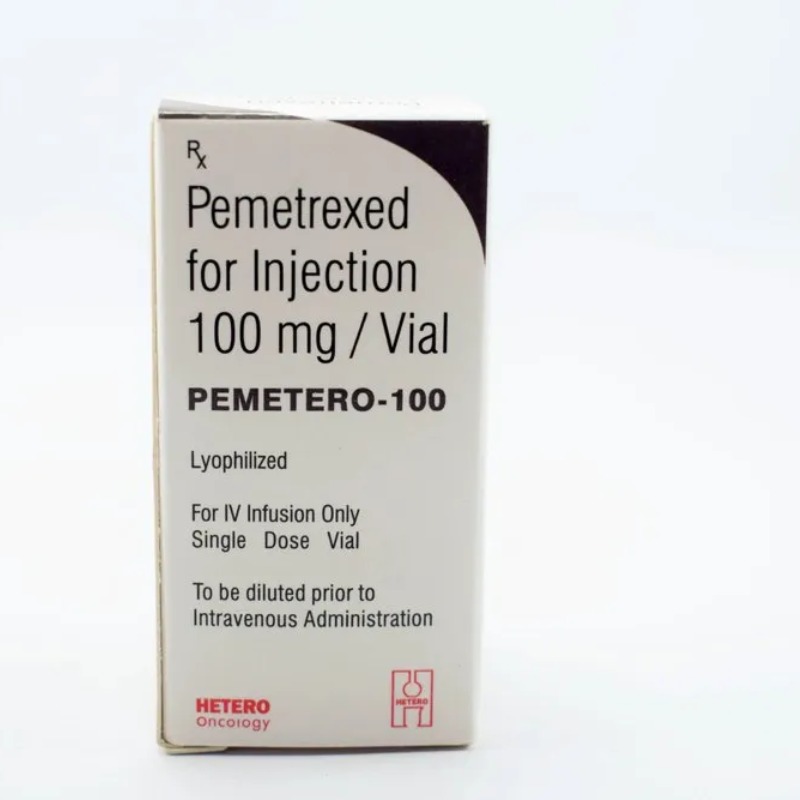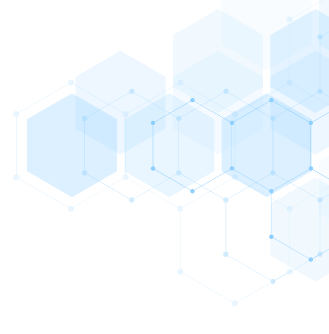DESCRIPTION
Mechanism of Action
• Pyrrolopyrimidine antifolate analog with activity in the S-phase of the
cell cycle.
• Transported into the cell primarily via the RFC and to a smaller
extent by the folate-receptor protein (FRP).
• Metabolized intracellularly to higher polyglutamate forms by the
enzyme folylpolyglutamate synthase (FPGS). The pentaglutamate
form is the predominant intracellular species. Pemetrexed polyglutamates
are approximately 60-fold more potent than the parent monoglutamate
compound, and they exhibit prolonged cellular retention.
• Inhibition of the folate-dependent enzyme thymidylate synthase (TS)
resulting in inhibition of de novo thymidylate and DNA synthesis.
This represents the main site of action of the drug.
• Inhibition of TS leads to accumulation of dUMP and subsequent
incorporation of dUTP into DNA, resulting in inhibition of DNA
synthesis and function.
• Inhibition of dihydrofolate reductase, resulting in depletion of reduced
folates and of critical one-carbon carriers for cellular metabolism.
• Inhibition of de novo purine biosynthesis through inhibition of
glycinamide ribonucleotide formyltransferase (GART) and aminoimidazole
carboxamide ribonucleotide formyltransferase (AICART).
Mechanism of Resistance
• Increased expression of the target enzyme TS.
• Alterations in the binding affinity of TS for pemetrexed.
• Decreased transport of drug into cells through decreased expression
of the RFC and/or FRP.
• Decreased polyglutamation of drug, resulting in decreased formation
of cytotoxic metabolites.
Absorption
Pemetrexed is given only by the IV route.
Distribution
Peak plasma levels are reached in less than 30 minutes. Widely distributed
throughout the body. Tissue concentrations highest in liver, kidneys,
small intestine, and colon.
Metabolism
Significant intracellular metabolism of drug to the polyglutamated
species. Metabolism in the liver through as yet undefined mechanisms.
Principally cleared by renal excretion with as much as 90% of the drug in the
urine unchanged during the first 24 hours after administration. Short
distribution half-life in plasma with a mean of 3 hours. However, relatively
prolonged terminal half-life of about 20 hours and a prolonged intracellular
half-life as a result of pemetrexed polyglutamates.
Indications
1. Mesothelioma—FDA-approved in combination with cisplatin for
treatment of locally advanced or metastatic nonsquamous NSCLC.
2. NSCLC—FDA-approved in combination with cisplatin for the
initial treatment of locally advanced or metastatic nonsquamous
NSCLC.
3. NSCLC—FDA-approved as second-line monotherapy for locally
advanced or metastatic nonsquamous NSCLC.
4. NSCLC—FDA-approved as maintenance treatment of locally
advanced or metastatic nonsquamous NSCLC whose disease has
not€progressed after four cycles of platinum-based first-line
chemotherapy.
5. Pemetrexed should not be used in patients with squamous cell
NSCLC.
Dosage Range
1. Recommended dose as a single agent is 500 mg/m2 IV every
3€weeks.
2. When used in combination with cisplatin, recommended dose is
500€mg/m2 IV every 3 weeks.
Drug Interaction 1
Thymidine—Thymidine rescues against the host toxic effects of pemetrexed.
Drug Interaction 2
5-FU—Pemetrexed may enhance the antitumor activity of 5-FU. Precise
mechanism of interaction remains unknown.
Drug Interaction 3
Leucovorin—Administration of leucovorin may decrease the antitumor
activity of pemetrexed.
Drug Interaction 4
NSAIDs and aspirin—Concomitant administration of NSAIDs and
aspirin may inhibit the renal excretion of pemetrexed, resulting in enhanced
drug toxicity.
Special Considerations
1. Use with caution in patients with abnormal renal function.
Important to obtain baseline CrCl and to monitor renal function
before each cycle of therapy. Should not be given if CrCl < 40 mL/
min.
2. Dose reduction is not necessary in patients with mild-to-moderate
liver impairment.
3. Monitor CBCs on a periodic basis.
4. Use with caution in patients with third-space fluid collections such
as pleural effusion and ascites, as the half-life of pemetrexed may be
prolonged, leading to enhanced toxicity. Should consider draining of
fluid collections prior to initiation of therapy.
5. Dietary folate status of patient may be an important factor in determining
risk for clinical toxicity. Patients with insufficient folate
intake may be at increased risk for host toxicity. Evaluation of serum
homocysteine and folate levels at baseline and during therapy may be
helpful. A baseline serum homocysteine level >10 is a good predictor
for the development of grade 3/4 toxicities.
6. All patients should receive vitamin supplementation with 350 mg/day
of folic acid PO and 1,000 mg of vitamin B12 IM every three cycles
to reduce the risk and incidence of toxicity while on drug therapy.
Folic acid supplementation should begin 7 days prior to initiation of
pemetrexed treatment, and the first vitamin B12 injection should be
administered at least 1 week prior to the start of pemetrexed. No evidence
has been found to suggest that vitamin supplementation
reduces clinical efficacy.
7. Prophylactic use of steroids may ameliorate and/or completely eliminate
the development of skin rash. Dexamethasone can be given at a
dose of 4 mg PO bid for 3 days beginning the day before therapy.
8. NSAIDs and aspirin should be discontinued for at least 2 days
before therapy with pemetrexed and should not be restarted for at
least 2 days after a drug dose. These agents may inhibit the renal
clearance of pemetrexed, resulting in enhanced toxicity.
9. Pregnancy category D. Breastfeeding should be avoided.
Toxicity 1
Myelosuppression. Dose-limiting, dose-related toxicity with neutropenia
and thrombocytopenia being most commonly observed.
Toxicity 2
Skin rash, usually in the form of the hand-foot syndrome.
Toxicity 3
Mucositis, diarrhea, and nausea and vomiting.
Toxicity 4
Transient elevation in serum transaminases and bilirubin. Occurs in
10%–15% of patients. Clinically asymptomatic in most cases.
Toxicity 5
Fatigue.
SPECIFICATION


Login To Comment